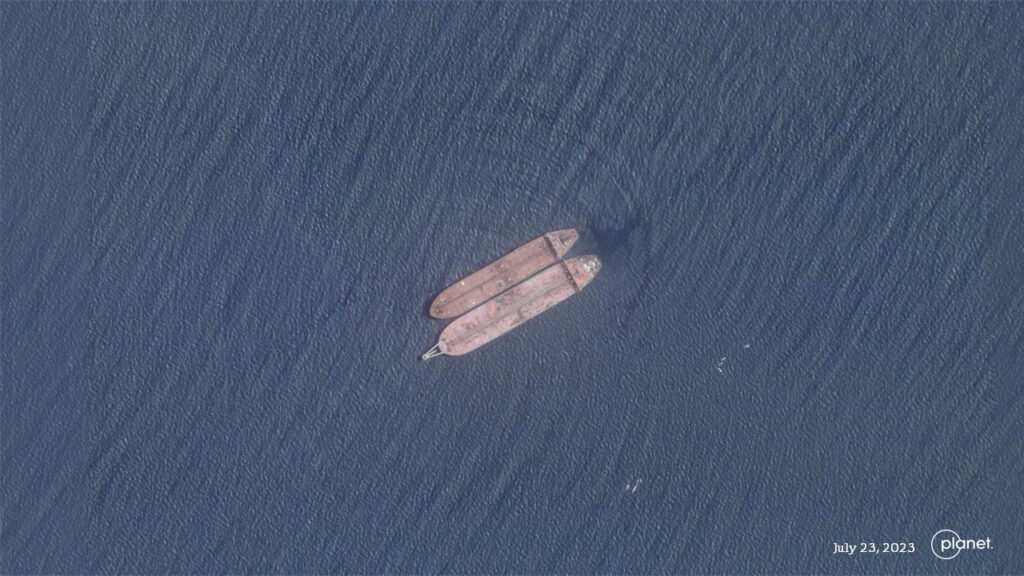On July 25, 2023, the United Nations officially started the transfer of 1.14 million barrels of oil from the FSO SAFER, an aging oil tanker on the coast of conflict-struck Yemen. With the arrival of a replacement tanker, NAUTICA, renamed to YEMEN, the ship-to-ship transfer began, and is expected to take at least 19 days. This has been a major milestone for the international community to address the environmental dimensions of armed conflict and shows the potential and urgent need for a coordinated international mechanism to address conflict-linked environmental emergencies.
The FSO SAFER salvage operation will help avoid the potential regional environmental and humanitarian disaster in the case that the ship would have sunk or exploded. The estimates by experts are that an oil spill would have affected nearly 700,000 livelihoods, blocked humanitarian aid to millions of affected people, and would have taken at least 20 billion USD to clean-up, while a fire and burning of the oil would have caused serious air pollution, affected crops and water wells in both Yemen and Saudi Arabia.
A leaking oil tanker in a tinderbox
Since the start of the 2015 war between Ansar Al Allah — or the Houthis — and the Yemeni government, this decades-old oil tanker posed a huge environmental risk as it was abandoned and lacked the necessary maintenance. The Yemeni government flagged its concerns to the UN in early 2017 seeking for a solution. Awareness-raising by experts and environmental and human rights groups helped to build pressure to find a solution for this toxic ticking time-bomb. Due to the political sensitivity over the status of the Houthi-controlled vessel, which needed international funding to find a replacement tanker, the process moved slowly, and faced many delays. Media awareness, joint statements by civil society groups supported by PAX, and debates in the UN Security Council, helped to keep the focus on this international environmental security risk. Meanwhile, a similar but smaller issue remains, with the ongoing concerns around leaking abandoned oil tankers in the Port of Aden in southern Yemen, documented by PAX in collaboration with Yemeni partners in 2022. This has resulted already in an assessment and potential future removal of the ships with financial support of Japan.
The break-through in the SAFER situation came about when a core-group of States, including the Netherlands, pushed the decision through, due to their concerns about the urgent risks outlined above. Despite the financial set-back due to the Russian invasion of Ukraine, which massively increased the price for the replacement tanker, the operation moved ahead with support of the Dutch Boskalis Group, which specializes in salvage operations. Despite this transfer, there remain legitimate questions over what will happen with the fossil fuels aboard the tanker, and the need for oil companies to contribute to this operation. The $140 million dollar salvage operation is mostly funded by States, while polluting fossil fuel companies that made use of FSO SAFER keep making billions in profit. The UN Secretary General stated that the UN still is $20 million short to finalize the operations.

The need for an environmental response mechanism in conflict-affected areas.
PAX congratulates the many UN organisations and supporting States for their perseverance to bring this operation to a good end and prevent a looming disaster. More importantly, this operation underscores both the need and opportunity for the international community to set-up a coordinated mechanism that is able to swiftly and coherently respond to environmental emergencies in conflict-affected areas to protect people and the eco-systems they depend on. Ad-hoc responses to environmental crises in conflict-affected areas such as in Yemen are often costly, time-consuming and depend on often fickle political will. The UN and its Member States should support the establishment and resourcing of an international environmental response mechanism, ideally with a supporting and holistic Environment, Peace and Security (EPS) agenda through a UN resolution, in order to ensure that the international community is able to better and more swiftly react when such occasions arise again – as they likely will. The lack of such a structural approach to conflict-pollution and wider environmental risks from violence and conflict highlights the need for building a strong EPS agenda and expertise within international response agencies. PAX continues to work through the various UN forums to advocate for such an approach.




